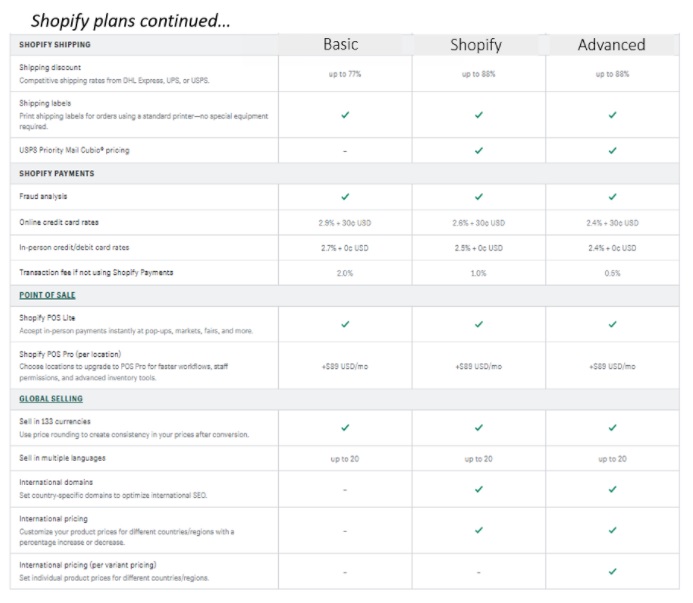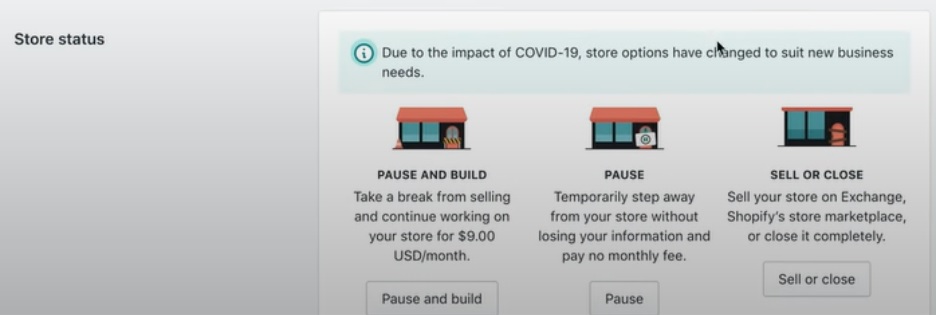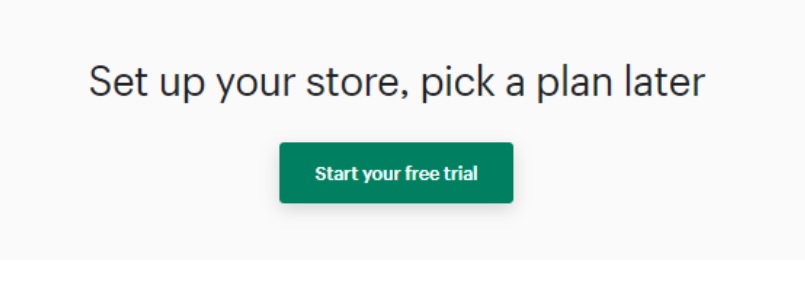Shopify Pricing: Which Plan Should You Get?

You might be thinking of using Shopify to launch a website and sell goods online. There are several Shopify pricing plans to choose from, and you might be wondering which one is the right one for your business.
The best Shopify pricing plan for your business depends on factors like industry, product, and profit margins. I’ll give you the rundown of the different pricing options, their fees, and what benefits they offer.
I am going to cover the main points that might make one pricing plan more attractive than another. When you are finished reading this article, you will know which plan is best for your project and what alternatives are available if you don’t think Shopify is right for you.
Table of Contents
An Overview of Shopify Plans
Shopify is a great option for those who want a robust and scalable platform. It has a free trial option as well as three pricing plans: basic, Shopify, and advanced.
The first plan, Basic Shopify, costs $29 per month and comes with all the basics to start a new business. Specifically, it includes unlimited products, 24/7 support, and an online store with blog. The plan also includes a free SSL certificate as well as abandoned cart recovery features.
Shopify is a great option, but it is a little pricier. It costs $79 per month and comes with Gift Cards, Professional Reports, and 5 Staff Accounts.
Advanced Shopify comes with a lot of features, including 15 staff accounts and advanced reports, but it costs $299 a month.
The Shopify Basic plan is a perfect starter option for small businesses that don’t need any add-ons. It doesn’t come with any add-ons, but it does come with the Shopify POS app and Third-party POS apps.
The Shopify and Advanced Shopify plans come with more add-ons, such as hardware support, register shifts, staff POS pins, and the ability to work in a multi-location environment.
Shopify has different payment rates for online and in-person transactions. For online transactions, the rates are 2.2%+30 cents on Basic Shopify, 2.6%+30 cents on Shopify, and 2.4%+30 cents on Advanced Shopify. For in-person transactions, the rates are 2.7% on Basic Shopify, 2.4% on Shopify, and 2.4% on Advanced Shopify. Additionally, Shopify only charges additional fees for payment providers aside from Shopify at 2%.


An In-depth Look At Shopify Plans
Basic Shopify Plan
Going for $29 per month, basic Shopify is for anyone who wants a functional but aesthetically pleasing store that you can experiment, grow and learn with. In short, if you are on a budget, this is the plan for you.
And the price is worth it considering you get a website and blog without investing in building one separately.
The other additional features too make this plan quite a steal! You get:
- Discount codes and gift cards. These are great for increasing sales through upsells and for building customer loyalty
- Abandoned cart recovery. No need to lose a customer just because they didn’t check out. Engage them to come back and complete their purchase.
- 2 Staff accounts. While 2 team members aren’t many, it’s still significant help when you need to get your business from the ground.
- Inventory locations. Make your inventory accessible through your physical outlets.
- Sales channels. Sell on multiple social media channels and on different marketplaces.
I think these are very impressive features for a software’s basic plan. That said, there are some missing features which I think would be really nice to have on this plan, for instance reports. But there are also other features that don’t come with the basic plan that aren’t necessarily a deal breaker. For instance, international pricing. This is only a deal breaker if you are targeting an international audience, in which case you should upgrade to a higher tier.
Shopify Plan
With unlimited products, more staff accounts (up to 5), more inventory locations (also 5), and global selling features, the Shopify plan is best suited for growing businesses.
It costs $79 per month. Unlike the basic plan, this Shopify plan has reports, although only the standard ones. It also gives you more shipping options, such as USPS priority mail Cubic pricing.
While the basic plan has global selling, it is very limited and doesn’t support international domains or international pricing. The Shopify plan supports those features.
There are however some downsides to the Shopify plan. For instance, it doesn’t support the international variant pricing feature. Without this feature, you cannot set prices for individual products in different countries.
Another feature that’s missing is the third party calculated shipping rates. This feature allows users who have accounts with a shipper to offer negotiated rates to their customers on Shopify. If you have preferential shipping rates from your shipper, you cannot use them on Shopify if you are on this plan.
Advanced Shopify Plan
This is Shopify’s premium plan. It goes for $299, which is a huge jump from Shopify plan’s $79, but for this much, you get more powerful features such as:
- Advanced reports. With this feature, you can power your business decision machine with insightful analytics.
- Third party calculated shipping rates. Get an edge over your competition with preferential shipping rates.
- Up to 15 staff accounts. You will need all the help you can get when your business expands. More staff accounts mean you can bring onboard a bigger team.
- More inventory locations (up to 8). Business expansion might mean managing your stock from more physical locations. This allows you to bring your stock closer to your customers.
- Global selling, which unlike the Shopify plan also includes international variant pricing. International variant pricing is a huge addition to your business as it helps you to personalize your offers.
Don’t forget that in addition to all these features, you’ll still get other features available in the other Shopify plans, such as: abandoned cart recovery, unlimited listings, discount codes, gift cards, manual order creation, SSL certificates, among others.
Additional Shopify Plans
There are two other Shopify plans designed for specific needs that cannot be met by the basic, Shopify or advanced plans. They include Shopify Lite and Shopify Plus.

Shopify Lite
At $9 per month, Shopify lite is a super cheap option for anyone who wants to incorporate selling into their website, but without the bells and whistles that come with a full-on ecommerce site. It’s great if you want to just add a buy button on your site. With Shopify lite, you can create invoices, accept payments on your site, sell on Facebook, and manage customers through Facebook messenger.
If you have a blog or social media account and want to start selling from it, go for Shopify Lite.
Shopify Plus
Shopify plus costs start at $2000 per month, and is a plan targeted at enterprises that generate more than $1 million in revenue annually. This plan comes with some top-notch guarantees such as ensuring steady performance during traffic surges. It also provides hosting, 200TB storage, powerful selling and automation features, zero transaction costs, among others.
If you run a fast-paced high revenue business and would like to automate your team operations, this may be the plan for you.
Can You Cancel Your Shopify Subscription?
Yes.
If you are no longer interested in running a Shopify store, you can cancel it using the following steps:
i. While in Shopify admin, click on the settings icon, then select “plan and permissions”.
ii. Scroll down to store status. You will see these three options:

iii. Select “sell or close”, then choose the relevant action. You will be prompted to enter your password. Your store will be closed once you click confirm.
Before you cancel a subscription or deactivate your store, you need to delink any domains and also cancel any app subscriptions. You can do both of these things in the domains tab and the Apps tab respectively. You should also fulfill any pending orders.
Note: If you are not sure you want to cancel your Shopify subscription, you can select the pause option. This will put your account on hold for a while but will not close or deactivate it. The pause and build option will let you keep working on your store, but will not close it.
Does Shopify Have A Free Trial?
Yes!
Shopify offers a 14-day free trial that allows you to “set up your store, pick a plan later”.

Shopify Likes and Drawbacks
Likes
- Shopify is a simple to use tool suitable for people who are less tech savvy.
- Its wide variety of beautiful themes allows users to build beautiful stores. Some themes are also free.
- Shopify has a large number of plugins designed to automate selling, marketing, shipping, inventory management, and accounting tasks.
- Shopify provides 24/7 customer support via chat, email and phone
- It has marketing and upselling tools geared to increase sales
- Shopify has a pricing plan for all sizes of businesses
Drawbacks
- Although Shopify is generally cost effective, additional costs of apps and POS can make it expensive
In Conclusion: How Much Does Shopify Cost?
Basic plan, $29/month. If you are just launching your store, go for Shopify’s basic plan. Although it’s the lowest priced Shopify plan, it still has powerful features like team slots, unlimited products and cart abandonment. It also has basic features for global selling.
Shopify, $79/month. This plan is best for businesses that plan on or are on the verge of scaling up quickly, whether locally or globally. The transaction fees are lower and you will also enjoy better shipping discounts, making it a great plan for doing volume business.
Advanced Shopify, $299/month. This plan will serve you well if your company generates high revenue. Its advanced reports are handy for testing different sales and marketing approaches and for building accurate projections. It attracts lower shipping and transaction fees to keep the cost of doing business lower.
Want to see how Shopify pricing compares to other website builders? Check out some of our popular pricing guides below:
- Instapage pricing
- Optimizepress pricing
- Weebly pricing
- Webflow pricing
- Unbounce pricing
- Elementor pricing
- Duda pricing
- Squarespace pricing
This post may contain affiliate links and we may earn commissions. Learn more in our disclosure.



